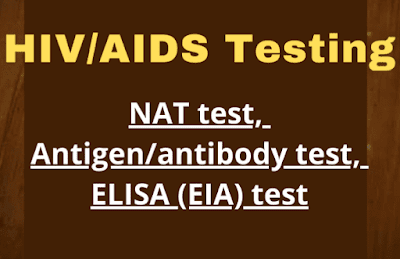Types
of HIV Diagnostic Tests
There are three types
of HIV tests available-
1. Nucleic acid tests (NAT)
2. Antigen/antibody
tests - If you have HIV, an antigen called p24 is produced even
before antibodies develop.
3. Antibody tests - ELISA (EIA) and Western
Blot

Know the modes of
transmission of HIV/AIDS and incubation period, sign and symptoms of HIV/AIDS.
HIV tests are typically
performed on blood or oral fluid.
1. Nucleic acid
tests (NAT)
Collect sample - blood from a vein
NAT lab test is blood tests used to detect the
genetic material of viruses and bacteria blood. It detects the actual virus in
the blood. HIV RNA tests is done to detects HIV's genetic material. The
test report can tell if a person has HIV and how much virus is present in the
blood (known as an HIV viral load test). The test results may take several days
to be available.
A nucleic acid test
(NAT) can usually provide
information if have HIV infection 10 to 33 days after an exposure.
2. Antigen/antibody test
Collect sample - blood from a vein
An antigen/antibody lab test looks for both HIV
antibodies and antigens present in blood. Antibodies are produced by immune
system when exposed to viruses such as HIV. Antigens are foreign substances
that cause immune system to activate against it.
If individual have HIV, an antigen called p24 is
produced even before antibodies develop. The test results may take
several days to be available.
There is also a rapid antigen/antibody test
available that is done with a finger prick and results take 30 minutes or less.
An antigen/antibody
test - Laboratory test on blood
from a vein can usually detect HIV infection 18 to 45 days after an exposure to
virus .
Antigen/ antibody tests done from a finger prick
blood can take longer to detect HIV (18 to 90 days after an exposure).
3. Antibody tests
Collect sample - blood from a vein, oral fluid
HIV antibody lab tests only look for antibodies
to HIV infection in blood or oral fluid.
Antibody tests that can detect HIV infection
after an exposure, Tests can be done with blood from a finger prick or with
oral fluid.
Most rapid tests and the only approved HIV
self-test are antibody tests.
With a rapid antibody screening test, usually
done from a finger prick blood or with oral fluid, results are ready in 30
minutes or less.
The oral fluid antibody self-test tell results within
20 minutes.
Antibody
(Serology) tests – To detect HIV infection can take 23 to 90 days after an exposure.
Note - No HIV test can detect HIV immediately after the
infection. If getting exposed by HIV infection in the last 72 hours,
contact to health care provider about post-exposure prophylaxis (PEP),
immediately.
If get an HIV test after a potential HIV
exposure and the HIV test result is negative, get tested again after the window
period.
Remember, Test Results HIV-negative if-
1. Done recent test is after the window period.
2. If hasn’t had a potential HIV exposure during
the window period. If have a potential HIV exposure, then need to be retested.
HIV Negative Test Result
A HIV negative result doesn’t necessarily mean
that don’t have HIV. This is due to the window period.
If retest again after the window period, have no
possible HIV exposure during the window period, and the result comes back
negative, then do not have HIV.
If any people sexually active or use needles to inject
drugs, continue to take measures to prevent HIV, taking medicines to prevent
HIV if at high risk.
HIV Positive Test Result
If use any type of antibody test and have a
positive result, need to another (follow-up) test to confirm HIV results.
If the follow-up test is also positive, it means
that have HIV infection.
Being HIV-positive does not
mean have AIDS. HIV can lead to AIDS and most advanced stage of HIV disease. If
a person does not get treatment or medical care HIV can progress into AIDS
But if a person with HIV takes
their HIV medicine as prescribed, they may stay healthy lives, and may never
be diagnosed with AIDS.
Diagnosed with HIV, Now it is mandatory
that start medical care, taking prescribed
HIV medicine and begins HIV treatment as soon as.
1. Antiretroviral therapy or ART (drug to treat
HIV infection) is recommended for people with HIV to treat HIV.
2. HIV medication works by lowering the amount
of HIV virus in body to very low levels. HIV drug can make the HIV viral load
so low that a test cannot detect it (called an undetectable viral load) and can
stay healthy lives. Having an undetectable viral load result also helps
prevent transmitting the HIV virus to others.
3. HIV medication slows the progression of HIV
and helps protect immune system, increase level of CD4 cells. For example, if
have an undetectable viral load, effectively no risk of transmitting HIV to an
HIV-negative people.







0 Comments